M,osdty
I normally don't comment but these (not just your comments, but others) need to be addressed, because every suburbanite afraid of their paths of convenience through urban areas being taken away need to recognize that people live in these places. Those bike lanes are in the urban and dense part of Toronto, where reducing the number of single-occupant vehicles on the road is finally being acted upon by the municipality to reduce deaths, improve active transport connections, and frankly improve the street life of the city for those who live there. Try taking the surface transit anywhere between the Don and Humber rivers, and your transit vehicle will be blocked at some point by single occupant vehicles taking up valuable urban space, not bicycles. The city is grid-locked and facing decades of population growth that cannot be met with more cars. Efforts to reduce single occupant vehicles' presence as a matter of policy have been proven in dozens of global cities as leading to an improvement in transit reliability, pedestrian, and active-transport users' safety. Frankly, the suburbanites who are locked into car dependency in their daily lives due to the low density of their built environment and struggle to imagine different ways of living have far too great an influence on the city planning of urban areas that they simply see as obstacles on their way back home. I am tired of people not in cars dying or facing daily perilous interactions because our infrastructure is piss-poor and drivers treat active transport users and pedestrians as obstacles. Something pucker-worthy happens to me on my Ottawa commute at least once a week, typically around slip-lanes (convenience design for drivers) that puts me and everyone else not in the car at risk of death or injury because some driver is eye balling their phone or forgot to caffeine drip that morning.
I'm an Ottawa four-season cyclist, and driver, from Toronto. Doug Ford lives in Etobicoke and hates the Bloor and University bike lanes because he sees them from his motorcade all week. His narrow, self-interested pandering is meant to directly appeal to other narrow, self-interested people who are stuck in the last century and forget that cities change to meet the needs of their people. City emergency services and transit won't have problems getting to their destinations if we reduce the number of private, single occupant vehicles on the roads in the city. Improving active transport and transit are big pieces to accomplishing this goal. Other cities, countries managed to lower road deaths and improve road designs with new rebuilds to reduce vehicle speeds and improve drivers' attention within urban areas or along suburban arterials where bike infrastructure makes sense. The point is to reduce the number of cars in cities and encourage other forms of transport - this helps everyone that lives in that city, including drivers. The reason bike lanes seem empty much of the time is because they are more efficient - bikes take up less space, cars take up a lot. Nect time you are traffic and your vehicle is stopped, look around and count the people, and try to imagine them all together outside of their cars. Not such a big group after all.








